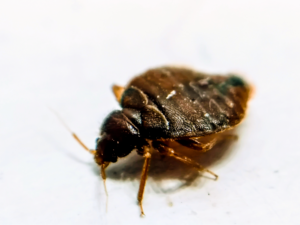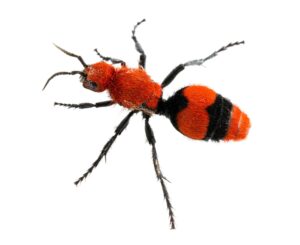Home / Blog / Understanding Love Bugs: How to Prevent These Peculiar Pests
Understanding Love Bugs: How to Prevent These Peculiar Pests

Scientifically reviewed by Rachel Maldonado
-Published on July 24, 2024
-Updated on August 27, 2024
Understanding Love Bugs: How to Prevent These Peculiar Pests
Have you ever sat on your porch enjoying your morning coffee, only to find yourself being swarmed by tiny black bugs? If so, you might have encountered love bugs.
In certain parts of the United States, particularly the Southeast, love bugs can be a significant nuisance, especially during their peak seasons in May and September.
While not harmful, these pests can cause a lot of headaches for homeowners – there’s not much that’s actually “loveable” about them! In fact, during peak seasons, love bugs can appear in such large numbers that they hinder visibility while driving!
Don’t want to deal with them? We’ll give you some tips in this post.
What Are Love Bugs?
Love bugs, also known as Plecia nearctica, are pint-sized but pesky insects that often appear in large swarms. These bugs are easily recognizable by their black bodies and red thoraxes.
Found mainly in the southeastern U.S., love bugs are particularly abundant in Florida, Texas, and other Gulf Coast states.
Love bugs have two primary life stages:
- Larval Stage: During this stage, love bugs feed on decaying organic matter. A single love bug can produce up to 350 larvae, meaning that even a small infestation can quickly grow out of control.
- Adult Stage: This is when love bugs emerge in swarms. They are most active during the day and are commonly seen flying in pairs, often attached to each other.
Love bugs have two major swarming periods each year, typically from April to May and August to September. During these times, you may notice an increase in their population around your home.
So why are they named “love bugs?” The name “love bug” comes from their mating habits. During the spring and fall, as we just mentioned, you can see them flying around in pairs, connected abdomen-to-abdomen.
The Impact of Love Bugs on Your Home
While love bugs don’t bite or sting, they can still be a nuisance for homeowners.
For one, love bugs are attracted to light-colored surfaces. They often swarm around white walls, windows, and doors, leaving behind a sticky residue that’s difficult to clean.
Love bugs can also be a significant problem for drivers. Their bodies are acidic and can damage car paint if not cleaned off promptly – the residue can also leave behind streaks and messes on your windshield and windows. During peak seasons, it’s not uncommon to find your car covered in these insects.
And although love bugs don’t pose any direct health risks, their presence can still be unsettling. Large swarms can make outdoor activities unpleasant, and their residue can attract other pests.
With that said, they do also have some benefits for your garden.
For one, love bug larvae feed on decaying organic matter, helping to break it down and return nutrients to the soil.
Also, the presence of love bugs can attract other beneficial insects to your garden, such as ladybugs and lacewings.
Finally, while they’re not as effective as bees, love bugs do contribute to pollination, meaning their presence can help support the overall health of your garden ecosystem.
Tips for Preventing Love Bugs
The best way to deal with love bugs is to prevent them from becoming a problem in the first place. Here are some effective strategies:
- Keep Your Yard Clean: Since love bugs lay their eggs in decaying organic matter, keeping your yard clean is essential. Regularly remove leaf litter, grass clippings, and other debris. Maintaining a tidy yard will reduce the areas where love bugs can breed.
- Use Bug Repellents: Certain plants and essential oils can act as natural repellents for love bugs. Citronella, eucalyptus, and lavender are known to deter these pests. Consider planting these around your home or using essential oils in outdoor spaces.
- Switch Up Your Lights: Love bugs are attracted to UV light. Use yellow bug lights to make your home less appealing to them.
- Install Screens: One of the simplest ways to keep love bugs out of your home is to install screens on windows and doors. This can help prevent them from entering your living space, along with other pests like moths and gnats.
If you’re worried about damage to your car, you may want to wash your car regularly during love bug season. Applying a layer of wax or using a hood deflector can also protect your car’s paint.
What to Do If You Have a Love Bug Infestation
If you happen to find yourself dealing with an infestation, you should use a vacuum to remove love bugs from your home. This is an effective way to manage indoor infestations without using chemicals.
Take the time to regularly clean surfaces where love bugs tend to gather. Use a mixture of water and vinegar to remove sticky residue and deter future swarms.
Finally, if your love bug problem persists, consider consulting a pest control professional. They can provide targeted treatments to help manage the infestation.
Don’t Love ‘Em? Get Rid of Love Bugs With Hawx
Love bugs are a unique – and sometimes troublesome – pest for homeowners in the southeastern U.S. By understanding their behavior and implementing effective prevention strategies, you can keep your home and yard free from these pesky insects.
Don’t wait for love bugs to become a problem. Take action today and join our family of satisfied customers by contacting Hawx Pest Control.
Related Articles
Visit our blog to learn more.
→





